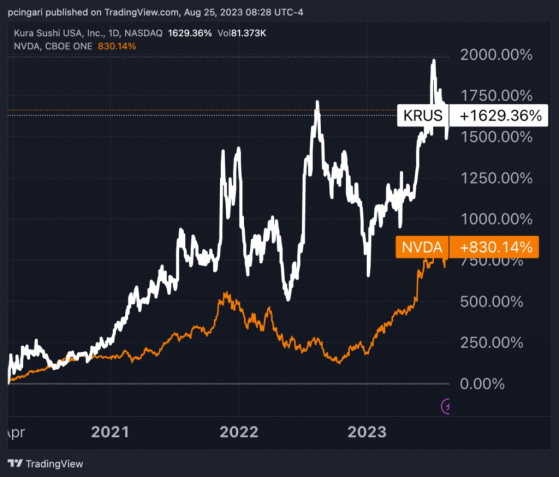Benzinga - by Piero Cingari, Benzinga Staff Writer.
Japan’s decision to release treated radioactive water from the Fukushima nuclear power plant has sent shockwaves through the global seafood market.
While the International Atomic Energy Agency vouches for safety, the move has elicited varied reactions.
Of particular concern is China’s sweeping ban on Japanese seafood imports and Hong Kong’s imposition of import curbs on select Japanese food products, citing contamination fears. This has sparked an increase in sushi prices as Hong Kong’s restaurants grapple with the reduced availability of Japanese seafood.
Analyzing Japan’s Seafood Trade and Business Impact
Amid these shifts, it’s crucial to examine the intricate relationship between the United States and Japan in the seafood trade.Although most U.S. seafood imports hail from China, Thailand, Canada, Indonesia, Vietnam, and Ecuador, Japanese seafood remains integral.
In 2022, the United States imported a notable 11,994 tons of fish fillets and fish meat from Japan, amassing a total worth of $224 million, based on data furnished by the International Trade Center through the US Census Bureau. Notably, mollusks comprised a substantial portion of these imports, totaling 8,387 tons and valued at $173 million.
Imports of Japanese fish in the United States have been growing at an 8% annual rate between 2018 and 2022.
U.S.-Based Companies Importing Fish And Seafood From Japan
According to details gathered from Google Bard, a handful of American firms engage in fish imports from Japan. Here are a few of them:- Maruha Nichiro Corporation is a Japanese-based seafood company that has a subsidiary in the United States called Maruha Nichiro America. The company imports a variety of seafood products from Japan, including tuna, salmon, and shrimp.
- American Seafoods Group is a Seattle-based seafood company that imports fish from all over the world, including Japan. The company specializes in wild-caught seafood, such as salmon, halibut, and cod.
- Pacific Seafood is a Portland, Oregon-based seafood company that imports fish from Japan and other countries. The company sells a variety of seafood products, including fresh, frozen, and canned fish.
- United States Tuna Company is a San Diego-based seafood company that imports tuna from Japan and other countries. The company is a major supplier of canned tuna to the US market.
- Yama Seafood, Inc. is a Los Angeles-based seafood company that imports fish from Japan and other countries. The company specializes in Japanese fish, such as tuna, salmon, and yellowtail.
- Kura Sushi USA, Inc. (NASDAQ:KURA) is a conveyor belt sushi restaurant chain that has 47 locations in the United States, but does not directly import fish from Japan. The company sources its fish from domestic suppliers, such as Catalina Offshore Products and American Seafoods Group. Distinguished by its innovative dining experience, the company employs technology such as tablet-based ordering and robotic fish delivery to enhance customer engagement. Kura Sushi’s shares have surged by more than 1,600% since hitting their low point in March 2020, doubling the remarkable AI-driven growth of NVIDIA Corp. (NASDAQ:NVDA), which has risen by over 800% since March 18, 2020.
Now Read: Is Nvidia Stock A Better Bargain Than Tesla? Chipmaker’s Epic Q2 Faces Investor Caution Ahead Of Powell’s Jackson Hole Speech
This content was partially produced with the help of AI tools and was reviewed and published by Benzinga editors
© 2023 Benzinga.com. Benzinga does not provide investment advice. All rights reserved.
Read the original article on Benzinga
